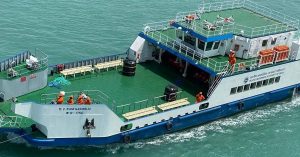The Inland Vessels Bill 2021:

The Inland Vessels Bill 2021 was passed in Lok Sabha.
- It replaces the Inland Vessels Act, 1917. The Bill seeks to introduce a uniform regulatory framework for inland vessel navigation across the country.
- Mechanically propelled inland vessels: The Bill defines such vessels to include ships, boats, sailing vessels, container vessels, and ferries.
- The central government will prescribe the: (i) classification, (ii) standards of design, construction, and crew accommodation, and (iii) type and periodicity of surveys, for these vessels.
- Certificates: To operate in inland waters, all such vessels must have a certificate of survey, and a certificate of registration. Vessels with Indian ownership must be registered with the Registrar of Inland Vessels (appointed by the state government).
- Insurance: The vessels must also have an insurance policy to cover liability for death, injury, or damage caused due to the usage of the vessel (including accidental pollution).
- Navigation safety: Such vessels will be required to follow certain specifications for signals and equipment to ensure navigation safety, as specified by the central government.
- Inquiry into accidents: All accidents aboard such vessels must be reported to the head officer of the nearest police station, as well as to a state government appointed authority.
- Manning requirements: The central government will prescribe the minimum number of people that vessels must have, for various roles. Violating these requirements will attract a penalty of up to Rs 10,000 for the first offence, and Rs 25,000 for subsequent offences.
- Prevention of pollution: Vessels will discharge or dispose sewage, as per the standards specified by the central government. State governments will grant vessels a certificate of prevention of pollution, in a form as prescribed by the central government.
- Development fund: The Bill provides for a development fund which will be utilised for various purposes including: (i) emergency preparedness, (ii) containment of pollution, and (iii) boosting inland water navigation. Each state will constitute such a development fund.
- Non-mechanically propelled inland vessels: The Bill empowers state governments to delegate certain functions related to non-mechanically propelled inland vessels to their local governments.




